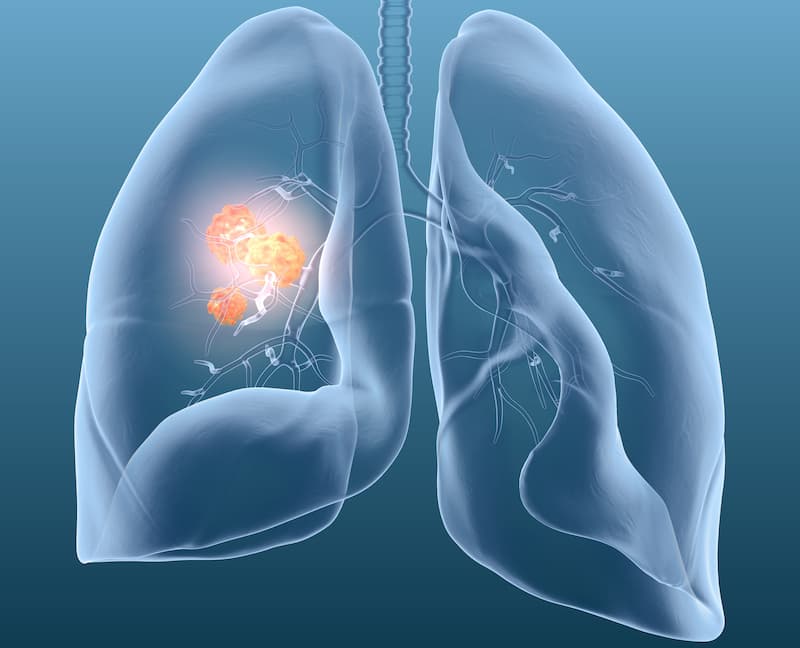Plasma-Based MRD Analysis May Predict Recurrence in EGFR-Mutant NSCLC
A disease-free survival and minimal residual disease event-free status was maintained for most patients with adjuvant osimertinib for EGFR-mutant NSCLC.
An end point combining the incidences of DFS and MRD events revealed 36-months rates of 86% with osimertinib vs 36% with placebo, with an HR of 0.23.

Plasma-based, tumor-informed minimal residual disease (MRD) analysis may predict disease recurrence during adjuvant treatment with osimertinib (Tagrisso) and during follow-up in patients with resected EGFR-mutated stage IB to IIIA non–small cell lung cancer (NSCLC), according to findings from an exploratory post hoc analysis of the phase 3 ADAURA trial (NCT02511106) published in Nature Medicine.1
Findings from the trial revealed that of 220 patients with successfully designed and validated RaDaR panels, which detect MRD and recurrence, 8% had MRD detected at random assignment before study treatment, including 4% of those receiving osimertinib and 12% receiving placebo. Additionally, of the 18 patients with detected MRD, 7 (39%) had stage II disease, and 11 (61%) had stage IIIA disease.
A total of 17 of 18 patients with MRD detected at random assignment experienced a disease-free survival (DFS) event. Additionally, the 5 patients with MRD positivity in the osimertinib group at random assignment generally had longer DFS than those in the placebo group. In the osimertinib and placebo groups, respectively, 3 vs 7 events were local and/or regional, 1 vs 5 events were distant, and 1 death occurred in the placebo arm.
“[T]his exploratory analysis of patients from the ADAURA trial suggests that plasma-based, tumor-informed MRD analysis may predict disease recurrence during adjuvant treatment and during posttreatment follow-up,” lead investigator Roy S. Herbst, MD, PhD, Ensign Professor of Medical Oncology and Pharmacology, assistant dean for Translational Research at Yale School of Medicine, and deputy director of the Yale Cancer Center, wrote in the publication with study coinvestigators.1 “We also show that a DFS and MRD event-free status was maintained for most patients during adjuvant osimertinib treatment and over 24 months posttreatment. These observations suggest that MRD monitoring may inform clinical intervention, including restarting or intensifying treatment.”
Patients who were 18 years and older with postsurgical stage IB, II, or IIA EGFR-mutant NSCLC in the phase 3 ADAURA trial were randomly assigned to receive either 80 mg of once daily osimertinib or 80 mg of placebo.2 Furthermore, patients were stratified according to disease stage, EGFR mutation type, and race. Patients were treated for a maximum of 3 years or until treatment discontinuation criteria were met.
The primary end point of the trial was DFS among those with stage II or IIIA disease per investigator assessment. Secondary end points included DFS among those with stage IB to IIIA disease. The exploratory end point was to assess the feasibility of circulating tumor DNA profiling for MRD detection in early-stage NSCLC after surgery with or without chemotherapy.
Plasma samples were collected from day 1 of random assignment, before dosing of study agent. Longitudinal samples were collected at 12-week intervals for up to 36 months, then at week 12 and 24 during the posttreatment follow-up period, defined as up to 60 months from random assignment. Afterward, samples were collected every 52 weeks until disease recurrence, death, or study end.
An end point combining the incidences of DFS and MRD events revealed 36-months rates of 86% (95% CI, 78%-92%) with osimertinib vs 36% (95% CI, 27%-45%) with placebo, with an HR of 0.23 (95% CI, 0.15-0.36) for osimertinib vs placebo. Additionally, either event was detected at any time post random assignment in 25% and 69% of each respective group. In the osimertinib group, 68% of DFS or MRD events occurred after treatment discontinuation or completion, 58% of which occurred within a year of treatment discontinuation or completion.
References
- Herbst RS, John T, Grohé C, et al. Molecular residual disease analysis of adjuvant osimertinib in resected EGFR-mutated stage IB–IIIA non-small-cell lung cancer. Nat Med. Published online March 17, 2025. doi:10.1038/s41591-025-03577-y
- AZD9291 versus placebo in patients with stage IB-IIIA non-small cell lung carcinoma, following complete tumour resection with or without adjuvant chemotherapy. (ADAURA). ClinicalTrials.gov. Updated April 1, 2025. Accessed April 4, 2025. https://clinicaltrials.gov/study/NCT02511106